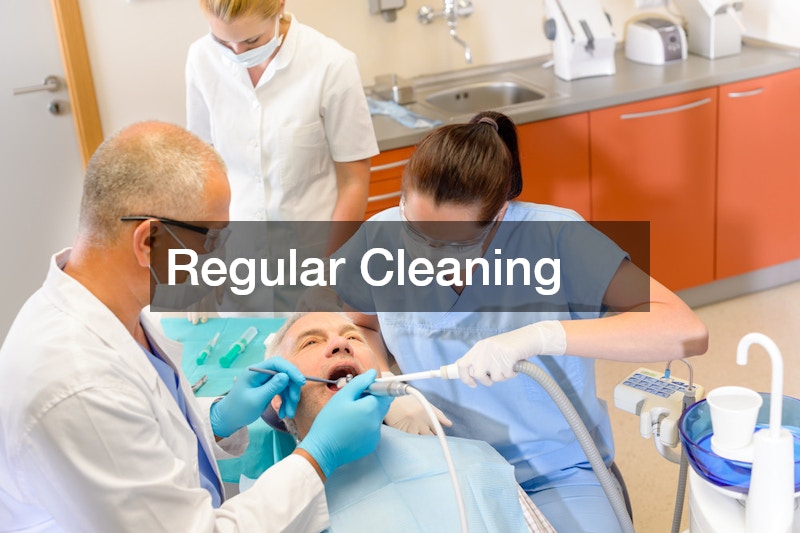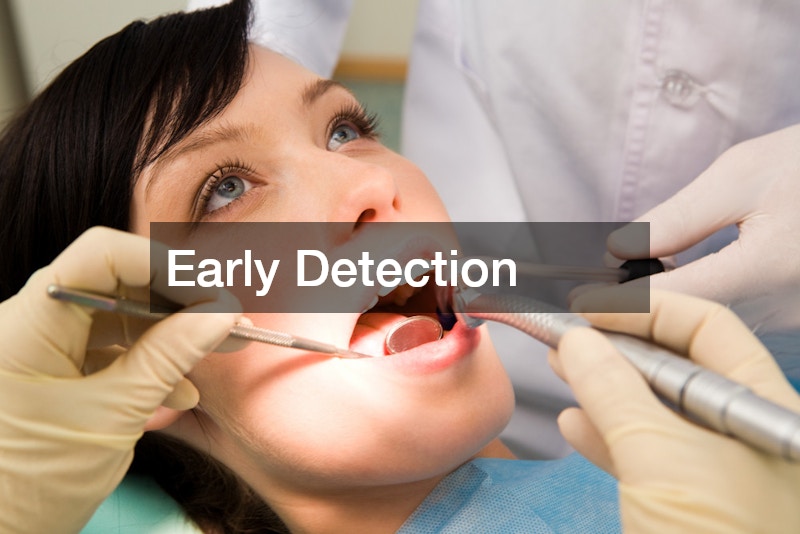
The importance of maintaining good oral health cannot be overstated. Basic dental care is not only about keeping your mouth free from cavities but is also a crucial component of your overall health and wellbeing. Many individuals underestimate the power of regular teeth cleaning and routine checkups at a dentist office, yet they pave the way for a lifetime of healthy smiles. From the early days of childhood to advanced years, adopting a regimen that includes basic dental care is essential. With the assistance of a family dentist and the tools available in modern dental offices, you can achieve optimal oral health. Additionally, basic dental care connects to numerous aspects of general well-being, preventing future health complications and ensuring a healthy lifestyle.
Regular Cleaning

Teeth cleaning forms an integral part of basic dental care. It involves both in-depth professional cleanings at dental offices and routine brushing and flossing at home. These actions help prevent plaque buildup, which can lead to cavities and gum disease. By removing tartar during cleanings, dental professionals can significantly reduce the risk of oral infections and outline effective personalized care strategies. Maintaining a schedule of regular teeth cleaning appointments is one of the most straightforward ways to ensure your oral health is in check.
Moreover, regular teeth cleaning supports the long-term preservation of your teeth. By addressing plaque and tartar, both of which harbor harmful bacteria, patients can avoid more severe treatments in the future. Ensuring that these routine cleanings occur consistently can save individuals from more complex procedures like extractions or fillings, which may arise from untreated oral health issues. The advice and knowledge provided by a family dentist, who will be familiar with your oral health history, can be instrumental in guiding you through this preventive care.
In essence, regular teeth cleaning plays a dual role. It not only aids in maintaining a clean and beautiful smile but also contributes significantly to your overall health. By preventing bacteria from entering the bloodstream through dental cavities and gum disease, the impact of oral health on general wellbeing becomes apparent. Engaging in consistent basic dental care and visiting a dental office allows for both detection and prevention of potential health issues that could affect other parts of the body.
Options For Everyone
Access to a family dentist offers diverse, tailored options for every member of the family. From pediatric dentistry to address children’s specific oral health needs to treatments for seniors, these professionals provide comprehensive options under the umbrella of basic dental care. This ensures continuity in care and builds a rapport that facilitates easier communication about dental habits and needs. Family dentists offer convenience, allowing multiple family members to have their appointments on the same day, saving time and effort.
The breadth of services that a family dentist provides includes preventive care as well as restorative procedures, all crucial parts of basic dental care. Whether dealing with a young child’s first teeth or addressing braces treatment for adolescents and teens, a family dentist is equipped to monitor and improve oral health over time. With modern dental cabinets and facilities, these professionals are prepared with the latest tools and technology, ensuring a top-tier patient experience.
Beyond convenience and comprehensive care, regular visits to a family dentist reinforce the importance of oral health from an early age. Early introduction to dental visits can reduce fear and anxiety associated with dental appointments, fostering a positive outlook towards oral hygiene. This holistic approach helps in creating a lifelong commitment to basic dental care, ensuring that each family member understands the significance of regularly maintaining their oral health.
Early Detection

Early detection of dental issues is one of the key benefits of maintaining regular appointments at dental cabinets. These facilities are equipped with the tools necessary to catch cavities, gum disease, and other oral issues before they develop into more significant problems. Routine exams provide an opportunity for dentists to identify and treat issues in their early stages, emphasizing the importance of incorporating basic dental care into your routine.
The use of state-of-the-art technology in dental cabinets enhances a practitioner’s ability to diagnose issues quickly and accurately. This means more effective treatment plans and, often, less invasive procedures. Whether it’s through X-rays, digital imaging, or other diagnostic tools, early detection is a powerful aspect of preventive dentistry and reinforces the importance of regular visits. When problems are caught early, the cost and complexity of treatment can be significantly reduced.
Furthermore, early detection ties strongly to overall health management. Oral health is closely linked with the body’s overall health, and issues like infections or even chronic conditions can be spotted through a dental examination. This interconnectedness highlights the profound impact that maintaining basic dental care practices can have not just on oral health, but on broader healthcare outcomes as well.
Avoiding Pain
One of the most compelling reasons to engage in proactive basic dental care is to avoid pain. By staying on top of dental checkups, you can prevent issues before they become painful or problematic. Dental offices are equipped to handle both preventive and urgent care, and regular checkups significantly minimize the likelihood of needing emergency treatments. Simple practices such as routine cleanings and flossing at home work in combination with professional dental services to avert the conditions that cause discomfort.
Avoiding pain not only pertains to physical sensations but also relates to the emotional stress of dental problems. Without routine care, problems like cavities and gum disease might progress to a point where treatments become more rigorous and costly. Dental offices emphasize preventive care that effectively thwarts such issues, reinforcing the crucial role that basic dental care plays in achieving a pain-free mouth.
Beyond immediate comfort, preventing dental pain contributes to a higher quality of life. By taking preventive measures through regular visits to your dentist and practicing good oral hygiene habits, you can preserve the integrity of your teeth and gums. In turn, this can reduce the incidence of pain and ensure that you can enjoy a wide range of foods and social situations without hesitation.
Better Overall Health
Basic dental care goes beyond achieving a healthy smile; it plays a significant role in safeguarding your overall health. Routine visits to the dentist office help in preventing not just cavities and gum issues but also systemic health conditions influenced by oral health. Poor oral hygiene can contribute to heart disease, diabetes, and other chronic health conditions, showcasing the necessity for maintaining basic dental care.
The mouth is often referred to as the gateway to the body, highlighting how oral health impacts general health. During dental checkups, dentists can recognize certain conditions that may signal an issue elsewhere in the body. Consistent basic dental care provides a layer of protection parallel to your general healthcare, reinforcing the interconnectivity between the two.
Additionally, studies have demonstrated that maintaining good oral health is linked with reduced risk for serious ailments. Basic dental care is a crucial component of preventive health strategies recommended by medical professionals. By committing to consistent dental appointments and effective oral hygiene practices, individuals can enhance their health outcomes and lead longer, healthier lives.
Preserving Your Teeth
The preservation of your natural teeth should be a core objective in your oral care strategy. Basic dental care, when paired with professional guidance from specialists like a periodontist, promotes the longevity and functionality of your teeth. Healthy gums are the foundation of dental health, and periodontal treatments focus on preserving this crucial aspect.
By following good oral hygiene practices and seeking regular evaluations, the preservation of teeth through basic dental care becomes manageable. Periodontal disease, if left untreated, can lead to tooth loss, highlighting the importance of professional interventions. Early detection and treatment with the help of a periodontist offer significant advantages in maintaining oral health.
Furthermore, preserving your teeth is an investment in your overall quality of life. Natural teeth provide a superior quality of chewing function and comfort compared to artificial replacements. Thus, implementing basic dental care not only supports your current dental needs but also preserves your ability to speak, chew, and smile confidently into the future.
Maintaining a Bright Smile

One of the aesthetic motivations for engaging with basic dental care is maintaining a bright smile. General dentistry offers numerous tools and treatments tailored to enhance and preserve the visual appeal of your teeth. Routine cleanings are vital in preventing stains and build-up, ensuring your smile remains white and bright over time.
In addition to professional cleanings, a proper daily dental routine supports the goal of maintaining a bright smile. Brushing twice a day and regular flossing helps remove food particles and bacteria that can discolor teeth. Through conscientious basic dental care, achieving and maintaining a bright smile is feasibly aligned with everyday habits and professional guidance.
Having a bright smile greatly impacts self-esteem and confidence. Whether in professional settings or social environments, a confident smile leaves a strong impression and influences how others perceive you. Investing in basic dental care and leveraging the expertise found in general dentistry can greatly assist in owning a smile that lights up any room.
Straight Teeth
Straight teeth are not just a matter of aesthetics; they also contribute to overall oral health. Misaligned teeth can lead to issues like difficulty in cleaning, increased risk of cavities, and gum disease. Braces treatment and other orthodontic procedures within the realm of basic dental care aim to correct these misalignments, promoting both health and beauty.
Orthodontic solutions available today are diverse and accessible to a wide range of dental needs. Braces treatment, whether traditional metal or more modern clear aligners, addresses the alignment challenges that individuals face. By interacting with general dentistry and orthodontic specialists, achieving straight teeth becomes a structured and achievable goal.
Straightening teeth contributes significantly to personal health and confidence. Proper alignment allows for easier chewing and biting, reducing the strain on the jaw and preventing future oral health issues. The enhanced aesthetic appeal of straight teeth also boosts confidence, characterizing the multiple advantages that arise from straightening teeth within basic dental care practices.
Jaw Pain Solutions
Jaw pain can stem from a variety of factors, including TMJ disorders, misaligned teeth, or excessive grinding. Innovative solutions like botox injection help in alleviating this discomfort within dentistry’s comprehensive care offerings. Basic dental care, incorporating these solutions, tackles the root causes of jaw discomfort effectively.
Addressing jaw pain requires a holistic approach involving diagnosis and customized treatment plans. Regular dental checkups are imperative in identifying the triggers of pain, followed by tailored interventions. Solutions such as botox injection can relieve tension associated with TMJ disorders, highlighting dentistry’s role in comprehensive pain management.
By engaging in basic dental care and seeking professional advice at dental offices, jaw pain can be substantially reduced or even eliminated. This approach leads to improved life quality, enabling individuals to enjoy everyday activities without the encumbrance of pain. Ensuring alignment with dental care professionals supports airway and jaw alignment and promotes long-term health.
Cost Savings

Investing time and resources in basic dental care can lead to significant cost savings in the long term. Preventive measures such as regular visits to a family dentist are far less costly than treatments for advanced dental issues, which often require more invasive and expensive procedures. Embracing a proactive approach to dental health makes financial sense, aligning with the principles of good business management.
Effective basic dental care involves keeping up with routine maintenance, much like the preventative maintenance strategies employed in successful business operations. This forward-thinking approach not only limits your outlay for potential future issues but also ensures that you’re maximizing the return on health investments. By maintaining regular check-ups and cleanings, larger, unanticipated dental costs can be minimized.
Moreover, investing in dental health equates to mitigating potential loss of income from missed workdays due to oral health issues. This aspect of basic dental care underscores its importance not only for personal health but also for productivity and financial well-being. Over time, maintaining good dental hygiene demonstrates fiscal responsibility, akin to effective business strategies aimed at optimizing long-term gains.
Conclusion
Basic dental care ultimately serves as the cornerstone of both oral and general health. Through regular teeth cleanings, frequent visits to a family dentist, and the integration of advanced dentistry methods like botox injections or braces treatment, individuals can optimize their health outcomes and preserve their smiles. Each section of this article elucidates critical aspects that contribute to a comprehensive dental care routine, emphasizing its importance that transcends mere aesthetics.

